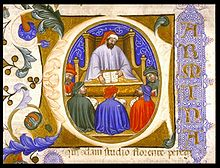St Boethius

Philosopher, statesman and martyr. Born in Rome around 475, Severenus Boethius was the son of a rich Christian Roman family. Orphaned as a young child he was brought up by the noble Aurelius Symmachus and eventually married his daughter. By the age of 30 he was famous as a great scholar and is recognised as one of the makers of the Christian West.
He translated Plato, Euclid, Aristotle and Pythagoras and Ptolemy into Latin. He also wrote theological works on the Trinity and the Incarnation and other books on music, logic, mathematics and even applied engineering. His most famous work was the Consolation of Philosophy, written in prison at the end of his life. King Alfred the Great, Chaucer and Dante all referred to this work in their own writings.
Boethius was also a statesman. Under the Ostrogoth emperor Theodoric, he and his two sons became consuls. But he fell out of favour with the court when he defended a man who had been accused of taking part in a plot against the emperor. After a lengthy imprisonment, he was executed in 524. As a victim of blatant injustice he was regarded as a martyr and his ancient cult was confirmed by Pope Leo XIII in 1883. His feast is kept in some churches in Rome, and in Pavia where his relics are enshrined in the church of St Peter in Ciel d'Oro.












